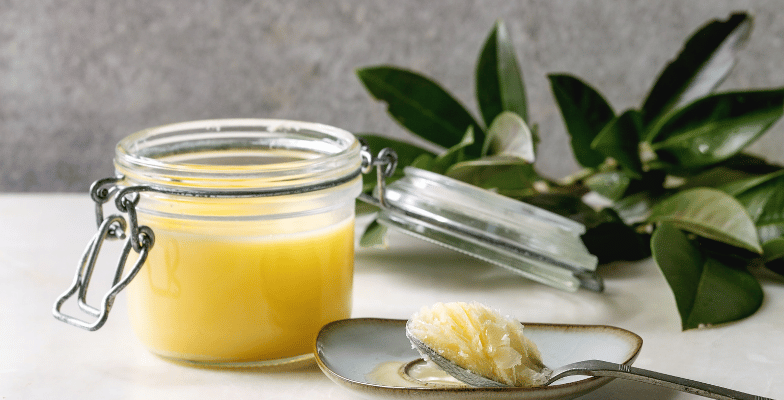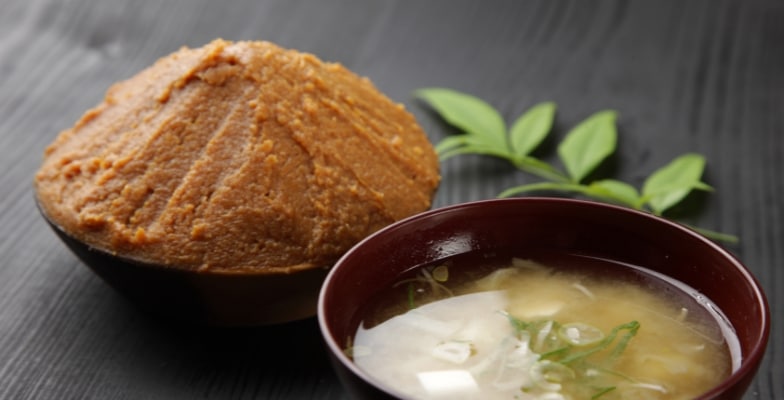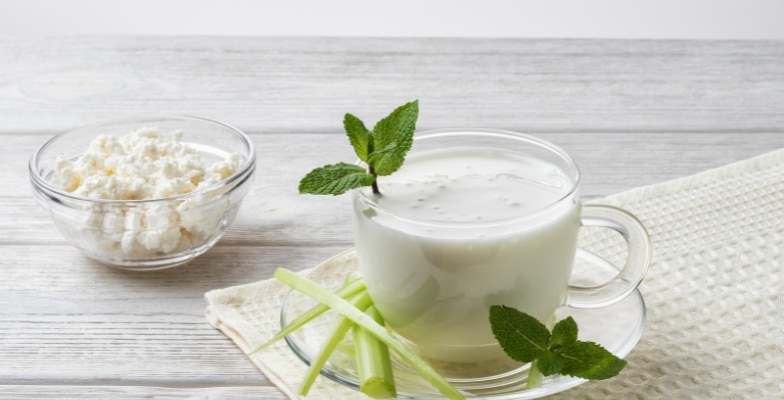Is Ghee Good For Health?
- How Is Ghee Made?
- Is Ghee Good For You? | Ghee Nutrition Facts And Health Benefits
- Conclusion And My Recommendation

Ghee has been a staple of Indian households for centuries. It’s also been an integral part of Ayurvedic medicine and even has a holy significance in its use as a ‘samagri’ to worship Hindu gods.
Ghee is a byproduct of milk. The milk can come from either buffaloes or cows. India is the largest producer of cow and buffalo milk in the world. The market size of ghee in India was 10,000 crores (USD 1.5 billion) as of 2016. Indians (especially Northern Indians) love ghee.
However, in the past few decades, the popularity of ghee has suffered because ~70% of its calories come from saturated fat. Because of this, people started to replace ghee with so-called healthier alternatives, like vegetable oils (sunflower, saffola, etc.).
How Is Ghee Made?
Ghee is clarified butter and, as I mentioned, is a byproduct of milk. It has a nutty flavor and many health benefits that I will discuss below. But first, let’s understand how to make ghee at home.
-Start by saving the cream (malai) that floats on top of the milk in a big container. The malai I am referring to is white makhaan, commonly known as butter in developed nations. Be sure to store this container of butter in the fridge at all times.
Note that you can only store it in the refrigerator for a few days, so if you prefer to make a large quantity of ghee at once, it’s better to freeze the butter. This way, you can store it for about a month!
-Once you have collected enough butter, take it out of the fridge for a few hours on the day you decide to make ghee.
-Empty the contents into a pot, and bring it to a boil on the stove.
-After some time, the butter will start to go to the bottom, and a golden liquid will begin to float on the top. This liquid is ghee.
-Keep the heat on until all the butter settles at the bottom and the ghee is floating on the top.
-Strain the ghee and store it in a container for use.
You can refrigerate ghee, but it isn’t necessary. Ghee is liquid at room temperature; however, it can turn solid when refrigerated.
Shelf-Life Of Ghee
There may be some milk solids left in ghee when you make it at home, so the shelf life of homemade ghee will be shorter than store-bought ghee. Homemade ghee should last for about a month.
To ensure that your homemade ghee lasts at least a month or so, make sure you store it in a glass container with a tight light. Keep it in a dry place away from sunlight. The presence of milk solids in homemade ghee will start to ferment, and it will probably start to smell bad after a few weeks.
Store-bought ghee is made using a more sophisticated process that ensures no milk solids are present, so it usually has a shelf life of up to a year! Any ghee (whether homemade or store-bought) can be healthy, provided the source of the milk is grass-fed/pasture-raised cows!
In India, ghee from grass-fed cows is known as pure ghee or desi ghee. It may be referred to as grass-fed ghee or Ayurvedic ghee in Western countries. Desi ghee, or Ayurvedic ghee, is sourced from grass-fed cows that are pasture-raised for the entire year. Its nutrition profile is superior to the ghee you find in the retail store.
Is Ghee Good For You? | Ghee Nutrition Facts And Health Benefits
In this section, I will discuss the nutrition profile and health benefits of desi ghee or grass-fed ghee.
1 Tablespoon (15g) Of Ghee Contains
Calories- 135
Fat-soluble vitamins- A, D, E & K
Fats (total fats)- 15g
Saturated fat- 10g
Monounsaturated fat- 4g
Polyunsaturated fat- 1g
Trans fat- 0g
Carbohydrates- 0g
Protein- 0g
Since ghee contains healthy fats, it helps the body absorb fat-soluble vitamins, which require fat as a medium in order to be absorbed.
Ghee Contains CLA
Ghee that comes from pasture-raised cow’s milk contains conjugated linoleic acid (CLA). When compared with commercial ghee (which comes from grain-fed cows), ghee from grass-fed cows contains 3-5 times more CLA. 1https://onlinelibrary.wiley.com/doi/10.1002/ejlt.201400469, 2https://www.ncbi.nlm.nih.gov/pmc/articles/PMC5980250/
Though studies are inconclusive, some research suggests CLA has immense health benefits, like anti-carcinogenic properties. It can help you cut body fat, build stronger bones, and fight chronic inflammation.
Ghee Is Viable For People Who Are Lactose Intolerant
Since there are little or no milk solids in it, milk sugar (lactose) is virtually nonexistent in ghee, making it suitable for people with lactose intolerance.
Ghee Is Ideal For Cooking (Including Deep Frying)
Besides coconut oil, I recommended ghee for cooking. Ghee has a smoke point of 485 degrees F (250 degrees C), which is far above the smoke points of most vegetable oils. The high smoke point ensures that ghee does not turn rancid when subjected to high temperatures.
When oil turns rancid, it forms free radicals (highly reactive species that cause cell damage) and also produces a toxic compound called acrylamide. 3https://www.ncbi.nlm.nih.gov/pubmed/27374529 Acrylamide is categorized as an extremely hazardous substance. 4https://en.wikipedia.org/wiki/Acrylamide Another way people ingest this harmful chemical is through smoking.
Ghee Has Many Health Benefits And Is Considered Sacred In Ayurveda
Ayurveda is an ancient medical system of India spanning over 5000 years! In Ayurveda, ghee is an integral part of Hindu religious ceremonies. Ghee also provides nourishment, aids in digestion, and can be used as a moisturizer or massage oil. Ghee is considered a sattvic food with healing properties.
Ghee Can Be Part Of A Weight Loss Or Weight Gain Diet
The most important thing when it comes to weight loss/weight gain is the total number of calories you eat in a day. If you want to gain weight, it’s best to eat the same or slightly more calories as your TDEE (assuming your body fat percentage is less than 15% for men and less than 25% for women).
Related Article: TDEE Definition: Total Daily Energy Expenditure
If your body fat percentage is more than the ranges above, it’s best to lower your body fat before trying to gain muscle. Now, if you have been following my work, you know that I recommend a generous intake of healthy fats.
Overall, it’s best to consume at least 20% (up to 40% or even 50%) of your total calories from healthy fats! For example, if your daily caloric intake is 1800 calories, you should consume at least 360 calories from healthy fats (20% of 1800 is 360). This equates to 40g of fats (360/9 as 1g of fat has 9 calories).
Conclusion And My Recommendation
Ghee has been used for thousands of years and has been a staple cooking oil in Indian households. Ayurveda considers ghee sacred with healing properties. Western medical science is not even a century old, and its ideas related to various topics change every few decades!
For a while, Western medical science blamed saturated fat for many diseases; however, in the past decade, new evidence has emerged that proves otherwise.
From my experience, I strongly recommend you find a source of ghee from happy, pasture-raised cows! Once you do, start using ghee as your cooking oil. The flavor you’ll get is fabulous. Just keep in mind that ghee is pure fat. And if you do not burn it off, it will be stored as body fat.
If you consume 1,800-2,500 calories, I recommend you include 15-20g of ghee in your daily diet. If you are on a ketogenic diet (or a variation of a low-carb diet), you can increase your ghee serving size by 1.5 or even double it.
What do you think about ghee? Do you use it as cooking oil? Have any questions or comments? Let me know below!

Skill-Based Education.
Global Recognition.
Powerful Community Building
Secure a certificate of completion in as little as a day by graduating from one of our free courses.
Get Access to Our Free Courses. No Credit Card Required.

Fabulous Body Membership
Your All-Access Pass to A Fabulous Body & A Rewarding Career
25+ Certificate Courses & Programs, All Included
15 Day Free Trial, 100% Money-Back Guarantee
About Akash Sehrawat
Akash is a creator of 25+ programs and certificate courses in which more than 200,000 students have enrolled both on Udemy and Fabulous Body's native platform. Akash is also an author of three books that can be found on Amazon. His answers on Quora have gathered more than 12 million views in less than a year.











Good article, now i will start using ghee. Thanks for sharing this. I don’t know why people are not accepting ghee as a healthy food.
Thanks Abhishek:) For decades saturated fats (ghee, egg yolk, whole milk) were demonized. It will take more time for this info to become mainstream!
Hi Akash,
Thank you so much for such a wonderful article. I am from North India- Delhi. And I know that Ghee is beneficial, however, I was apprehensive about it. But this article has given me all the facts and now I can have my portion of ghee guilt free and happily!
Good to know this Akanksha:)